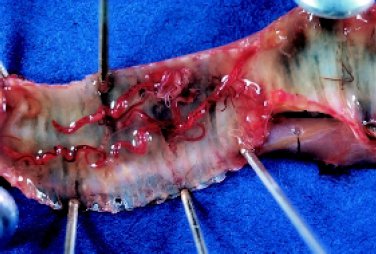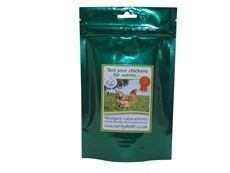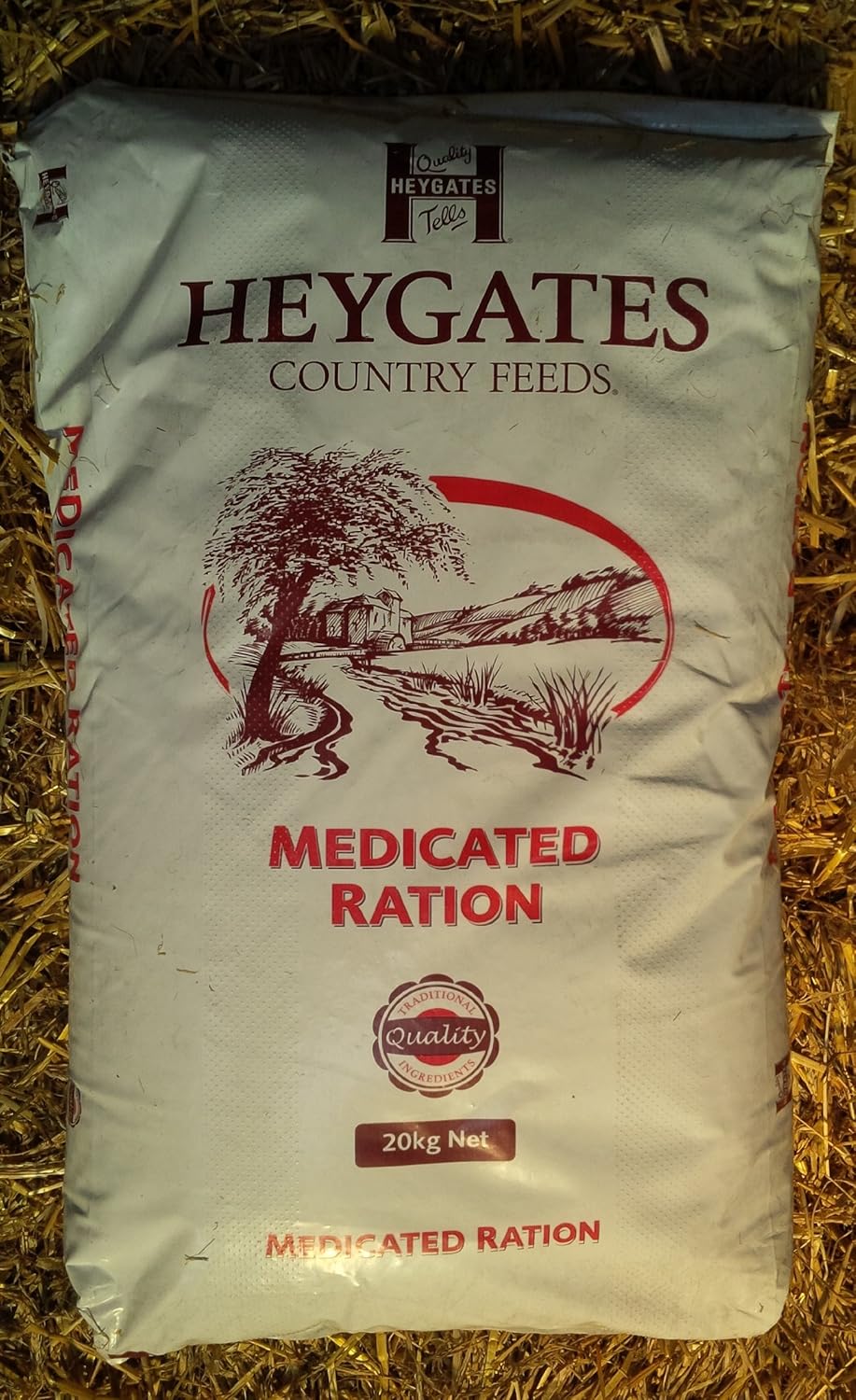
Poultry worms are parasites that, left untreated, can have a devastating effect on the health of your chickens and eventually kill them. For that reason, you need to worm chickens regularly, adopt good routines for looking after your chickens and check them routinely for signs of infestation.
In this article, I’ll explain how to do all these things, including how to go about worming chickens, but I thought that first it would be best to explain how worms affect chickens so that you understand why getting rid of them is necessary.
What are poultry worms?
There is a range of different worms and other parasites that live in chickens. Most live in the digestive system but others can inhabit other parts of the body, such as the lungs and respiratory system. Most worms can all harm your chickens if left to breed in large numbers, so its best to ensure that all of them are got rid of. Whilst you don’t need to be an expert on every different type of worm, it’s a good idea to know which worms you’re likely to come up against.
Types of worm found in chickens
Here are the types of worms found in chickens.
- Caecal worm: Small white worms found in the digestive system. Cause little damage and hens show no symptoms.
- Gapeworm: So called because they attach themselves to the windpipe and make the chicken gape for air. Can eventually suffocate if sufficient numbers are present. Also found in lungs. Eggs are spread by coughing.
- Gizzard worm: These worms are found in the in the gizzard and can cause chickens to be depressed and lose weight,
- Hair worm: Also known as Threadworm and Capillara, they are incredibly thin and live in the chicken’s crop, oesophagus, and intestine. Causes anaemia and green coloured diarrhoea. Can be a serious health problem.
- Roundworm: These large white worms can be found in the hen’s digestive system and can be clearly seen in their droppings. Their size can cause blockages and symptoms include anaemia, weight loss and depression.
- Tapeworm: Up to 25cm in length, the tapeworm lives in the intestines but does little damage to chickens. Its segments can be seen in the droppings.
If you want a more scientific explanation of each particular variety, then read this very informative article Internal Parasites of Poultry by Dr Jacquie Jacob from the University of Kentucky.
How do worms affect chickens’ health?
Worms cause a range of health problems for chickens, the most common of which are anaemia, weight loss, haemorrhaging and depression. As most worms live on the food a hen digests, they rob the chicken of essential nutrients and leave it malnourished. The bird gets thin, weak and lacks ability to fight off other infections. This is made worse by the accumulation of toxins from the worms’ own waste.
Problems increase as the worms breed and their population increases. With large infestations not only does malnutrition escalate, but the sheer number of worms can be so great that they cause blockages – both in the gut and in the respiratory system. This can be fatal in itself, but it can also lead to ruptures and internal haemorrhaging. Alternatively, the chickens can slowly starve to death or become so weak that other infections kill them off.
Because of the way we husband chickens it’s likely that chickens will always have some form of parasite living inside them. Regularly worming chickens combined with good husbandry prevents the likelihood of this turning into a life threatening situation.
How do chickens get worms?
Worms and worm eggs are everywhere. If a chicken has worms, some of their eggs are spread around the coop and run in the chicken’s faeces. With gapeworm, they are coughed out of the chicken’s mouth. Once out, they can live for up to a year in an inert state. It only takes one hen with worms to spread eggs all around the coop and run. Even when the droppings have been swept or washed away, some eggs will still be present as they will have been trampled into the soil.
To get infected, all a chicken has to do is swallow the worms’ eggs. There are two ways it can do this – directly or indirectly. Direct infection occurs because chickens constantly peck at the soil looking for grit and food and sooner or later will swallow worm eggs. Indirect infection happens when the eggs are swallowed by worms, snails and insects and the chicken eats these. Regardless of how they get there, once inside the chicken the eggs are stimulated to hatch and begin feeding, breeding and laying more eggs. The infestation begins.
What you need to remember as a chicken keeper is that, if your chickens have had worms, even if you’ve wormed them, they’ll get worms again from the worm eggs in the coop and run. You can’t just worm chickens once and think it’s a job done.
How do you know if your chickens have got worms?
Diagnosing worms in chickens isn’t easy. Just because you can’t see them doesn’t mean your hens don’t have them. In small numbers, it can be impossible to tell. Once there are larger populations it’s easier, particularly with gapeworm because of the way it makes the chicken gape, shake it’s head, stretch its neck and at times have rasping breath. With other types of worm its much more difficult as the common signs of a larger infestation: depression, weight loss, diarrhoea, reduction in egg laying, etc., can also be the symptoms of other illnesses.
Apart from the larger roundworm and tapeworm segments, it’s also difficult to spot worms in the hen’s faeces. If you can see the actual worms, it probably means there’s an infestation that needs quickly remedying.
One good technique you can use is to dilute chicken droppings in a clear glass bottle or jar. Diluting the droppings makes it easier to spot any worms that might be in there. This method can help find worms earlier and prevent illness starting.
 Another approach is to send a sample of poo off to the lab for a worm count where it will be examined under a microscope by a poultry veterinary expert who knows what to look for. You can choose your vet to do this for you or you can now purchase the Worm Count Kit from Amazon and post the sample to Westgate Laboratories who sell them. They’ll analyse the sample and send you back the results.
Another approach is to send a sample of poo off to the lab for a worm count where it will be examined under a microscope by a poultry veterinary expert who knows what to look for. You can choose your vet to do this for you or you can now purchase the Worm Count Kit from Amazon and post the sample to Westgate Laboratories who sell them. They’ll analyse the sample and send you back the results.
How to prevent chickens getting worms
By understanding how chickens catch worms, you’ll have a better idea of what you need to do to prevent them catching them. In essence, prevention is about good husbandry and whilst prevention reduces the risk of serious infection, worm management is an important task that every good chicken keeper has to deal with.
As the major source of infection is from worm eggs in droppings, keeping your coop and run clean is essential. You can’t prevent the chickens pooping everywhere but try to remove as much of it as is practical when you can.
Clean out the coop regularly, hose down the floor or the pull-out litter tray, if you have one, and use chicken friendly disinfectant when finished; this should help remove many of the eggs that are inside. A good dusting of diatomaceous earth on the coop floor will also help.
Another important task is to ensure that the feeder and waterer are placed in a position where the chickens can’t contaminate food and water with excrement. Also, try to avoid scattering pellets in areas where they can get excrement on them. If they have been knocked over and spread around the coop or run, sweep them up. They will definitely get eaten and if they have been in contact with excrement they may have eggs on them.
in the run, you should rake the surface when it’s dry to remove as much excrement as possible. The less poop, the fewer eggs. You can then use Net-Tex Ground Sanitising Powder as a way to kill the eggs. Another helpful technique is to keep the hens away from soil that is warm and moist – particularly mud when it is sunny. To do this, fill in muddy holes, buy a run cover for rainy days and lay a plank of wood over the well-worn, muddy pathways that chickens use on the way in and out of the coop.
If possible, the best method is to move the run every couple of months. Not only does this give the hens a fresh, green area to forage in, it also gives time for the old area to get washed clean by the rain and for the eggs to get killed off by the sun (they can’t survive in ultraviolet light) and the sanitising powder. If your chickens are anything like mine, they’ll soon scratch the ground down to bare soil and this will mean the sun can be more effective in killing the eggs. If you have grass, keep it short enough for the sun to penetrate through to the soil.
It’s best to move the run about 24 hours after you have wormed the chickens because in this short window they will be worm and egg free. This means when they move to the new run, they won’t be dropping any eggs that can re-infect them later.
How to treat chickens for worms
Most chicken keepers use Flubenvet when worming chickens. Flubenvet has been around a long time and is proven and trusted chemical wormer that kills both worms and eggs. It also kills all types of worm effectively (perhaps with the exception of the tapeworm) and is the only poultry worming treatment licenced for use in chicken feed. This means it is safe to eat eggs of chickens treated with it. The treatment for Flubenvet lasts for seven days and should be repeated after three weeks so that if your chickens get reinfected, newly hatched eggs are killed off before they can reproduce.
Flubenvet is given to the chickens as a powder which is added to chicken feed. For the vast majority of keepers with small flocks, the 1% Flubenvet powder is adequate for you needs. You need around 3g of powder per kg of food to be effective. Make sure the powder is distributed evenly so that all your hens get wormed.
For health and safety reasons, wear disposable gloves whilst handling and mixing Flubenvet and use a disposable dust mask (that conforms to European Standard EN149) to prevent breathing in any dust. You should always prepare in an open space and wash any body parts, including the eyes, which come into contact with the powder or dust. Avoid ingesting the chemical, too. When finished, safely dispose of the mask and gloves, dispose of any containers and thoroughly wash out any buckets you have used. Always read the manufacturer’s instructions carefully.
 To save you the trouble of mixing Flubenvet and to ensure you have exactly the right mixture, you can now buy layers pellets with Flubenvet premixed into it. Before buying, make sure you buy enough to fully worm your entire flock.
To save you the trouble of mixing Flubenvet and to ensure you have exactly the right mixture, you can now buy layers pellets with Flubenvet premixed into it. Before buying, make sure you buy enough to fully worm your entire flock.
Whilst safe, there are some downsides to using Flubenvet as a chicken wormer. As it is a chemical treatment, your eggs cannot be classified as organic if you use it on your hens. If you want organic eggs, you will need to use a different treatment. One such product is Verm-X, a herbal remedy, which will need to be used more frequently than Flubenvet. Flubenvet will be more effective.
The other downside is that, like antibiotics, overuse can cause worms to become more resistant to the chemicals. For this reason, good husbandry is very important and you should avoid treating the hens too regularly if there is no need for it.
Whilst this is general guidance, for specific advice about worming your hens you should seek the opinion of your vet.
How often should chickens be wormed?
New chickens should be wormed immediately to prevent them passing worms to the rest of the flock. For the flock as a whole, if you husband them well, then worming them with Flubenvet once every six months, should be sufficient, especially if you use Verm-x and apple cider vinegar on a monthly basis in between.
Verm-X is available in pellets and should be added to the feed, or in liquid form which like apple cider vinegar should be added to the hens’ drinking water (not in metal containers, though.) A teaspoon of apple cider vinegar in a litre of water is sufficient strength to work. Both Verm-x and apple cider vinegar change the pH balance in the chicken’s digestive system, making it a less suitable environment for worms to continue their life cycle.
Diatom Powder (food grade diatomaceous earth) can also be added to chicken feed at a rate of 5% to feed. Diatomaceous Earth is harmless to chickens but is made up of the crushed shells of prehistoric sea creatures. At a microscopic level, it is razor sharp and cuts through the protective outer layers of insects, eggs and larvae so that they dehydrate and die.
However, if you always keep your run in the same position then the chances of worms appearing increases. In this case, it’s better to worm once every three months, just to be on the safe side.
If you have found this article about worming chickens useful, please share.










